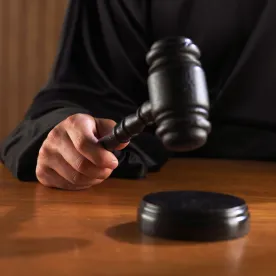The Federal Circuit today denied a challenge to its venue precedent in patent infringement cases, rejecting arguments that a U.S. district court should be precluded from hearing a patent infringement action over a non-resident corporation without an established place of business in the district. The case, In re TC Heartland, LLC, No. 2016-105, originated from the District of Delaware but would have had the greatest impact on the Eastern District of Texas, where 44% of all patent infringement cases were filed in 2015. (By comparison, Delaware received 12% of such filings.) The decision seems likely to refocus the attention of reformers toward bills pending in Congressional committees that would divert cases away from the Eastern District of Texas where so-called patent assertion entities (PAEs) regularly file their cases.
By way of background, Kraft sued Heartland in Delaware over Heartland’s allegedly infringing liquid water-enhancing products. Although Heartland ships these products into Delaware, Heartland is an Indiana corporation and does not have a regular place of business in Delaware. Heartland moved the district court to dismiss the case for lack of personal jurisdiction or to transfer it to Indiana. When the motion was denied, Heartland petitioned the Federal Circuit for a writ of mandamus directing the district court to either dismiss or transfer the suit.
In its opinion today, the Federal Circuit refused to issue the writ, stating that the venue and jurisdiction issues had been “firmly” and “definitively” resolved by 20-year-old precedents. The panel opinion, authored by Judge Moore, states that VE Holding Corp. v. Johnson Gas Appliance Co., 917 F.2d 1574 (Fed. Cir. 1990) —which established that corporate residency for venue purposes in patent cases is governed by the general venue statute authorizing suit against any entity subject to a court’s personal jurisdiction (28 U.S.C. § 1391) —was not nullified by language in a 2011 amendment to that statute or affected by a footnote in a 2013 Supreme Court opinion mentioning the special patent venue statute (28 U.S.C. § 1400(b)). Similarly, the panel’s opinion holds that Beverly Hills Fan Co. v. Royal Sovereign Corp., 21 F.3d 1558, 1571 (Fed. Cir. 1994)— which found sufficient contacts for personal jurisdiction where a nonresident defendant purposefully shipped accused products into the forum through an established distribution channel and the cause of action for patent infringement was alleged to arise out of those activities— was not affected by a footnote in a subsequent 2014 Supreme Court opinion on personal jurisdiction.
Given today’s result, and barring review of the Heartland panel’s decision by the full Federal Circuit, all eyes are likely to turn to Capitol Hill, where at least two bills are pending in Congressional committees that would restrict venue for patent cases. The Senate’s “Venue Equity and Non-Uniformity Elimination Act” (S. 2733) and the House’s “Innovation Act” (H.R. 9) have matching provisions that would restrict venue to districts where the defendant is incorporated, or has its principal place of business, or has a physical facility performing manufacturing or research and development on an accused product. In fact, the panel’s Heartland opinion cites to the pending Senate bill as evidence that Congress recognizes that patent venue is currently governed by VE Holding and that Congress must act to change the law if it sees fit.
Until then, it appears as if the Eastern District of Texas will continue to be the site for adjudicating the lion’s share of U.S. patent infringement cases.





 />i
/>i
